Collective Punishment and Mass Incarceration are Crimes
• Defend Prisoners’ Rights in Palestine and the U.S.
• Palestinians in Gaza City Begin Solidarity Hunger Strikes
• Statements from the Leadership Committee of Palestinian Prisoners on Hunger Strike
• Palestinian Prisoners’ Hunger Strike Determined and Spreading
• May 5: Mobilize in Support of Palestinian Political Prisoners!
U.S. Hunger Strikers
• 25 Ohio Super Max Prisoners Start a Hunger Strike
• California Prisoners in Solitary Petition United Nations: “CDCR Destroys Our Minds, Souls And Spirits”
Collective Punishment and Mass Incarceration are Crimes
Defend Prisoners’ Rights in Palestine and the U.S.
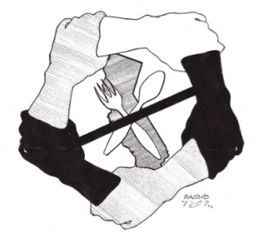
![]()
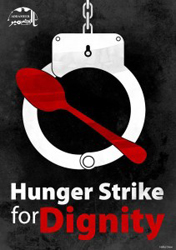
More than 2,000 Palestinian prisoners held in Israeli jails are currently on hunger strike. They are demanding respect for the rights of all prisoners and an end to the U.S.-backed Israeli occupation of Palestine. They are opposing the torture of solitary confinement and demanding an end to indefinite detention without charges or trials. As their statement initiating the hunger strike April 17 put it, “We believe in our right to liberty, our dignity, and the recovery of our stolen land and rights, and we announce the first spark of the battle in the occupation prisons.” Two of the prisoners have now been on hunger strike for 66 days (as of May 3) and, like the many hundreds of other strikers, remain firm in the fight for their just demands. Palestinian prisoners stood together with California hunger strikers last year and are calling on all in the U.S. and worldwide to support their just stand for prisoners’ rights and for Palestinians as a people.
The U.S.-Israeli occupation of Palestine has long been enforced through mass incarceration of those resisting, brutal raids and bombings, stealing of Palestinian lands and bulldozing of homes, forcing more than 5 million people to become refugees. Thousands of Palestinians are unjustly imprisoned for opposing the occupation. Today the hunger strikers are serving to unite Palestinians in the fight for their rights and to inspire peoples worldwide to step up their organized resistance.
The California prisoners meanwhile recently rejected proposals by the California Department of Corrections and Rehabilitation (CDCR) and are planning to resume their hunger strike this summer. Ohio prisoners are also again on hunger strike, demanding an end to solitary confinement, collective punishment and dignified treatment as human beings.
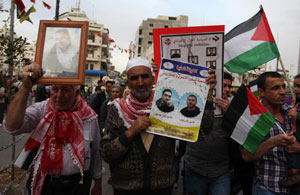 As the Palestinians describe their arrests and conditions in Israeli jails, the similarities to the mass racist incarceration and inhuman treatment of U.S. prisoners is striking. The U.S. and Israeli jails are used for collective punishment and humiliation and contribute to the genocide imposed on Palestinians and African Americans. They serve as testing grounds for the most horrific treatment and as an instrument to block and stifle resistance.
As the Palestinians describe their arrests and conditions in Israeli jails, the similarities to the mass racist incarceration and inhuman treatment of U.S. prisoners is striking. The U.S. and Israeli jails are used for collective punishment and humiliation and contribute to the genocide imposed on Palestinians and African Americans. They serve as testing grounds for the most horrific treatment and as an instrument to block and stifle resistance.
Israel increasingly uses “administrative detention,” which indefinitely jails people with no charges or trial. With recent laws and executive orders, the U.S. is also now poised to make mass use of such detentions in the U.S. as they already do at Guantánamo and Bagram. The Obama administration has made clear that it has the power to assassinate or detain anyone it brands as a threat, citizen or not, in the U.S. or not, with no crime committed. The silence of the Obama administration concerning the Palestinian prisoners indicates not only the continuing U.S. support for Israeli crimes, but a readiness to broadly implement the same indefinite detention here.
Both the U.S. and Israeli governments are showing themselves as unfit to govern, as they resort to violence as the weapon of choice and mass incarceration against the peoples. In standing as one with prisoners in Palestine and the U.S., defending prisoners’ rights, let us also organize for a new direction for society. We the people are the ones fit to govern. As part of advancing the fight for rights, let us organize today to be decision-makers and take up social responsibility to turn things around.
[TOP]
Palestinians in Gaza City Begin Solidarity
Hunger Strikes
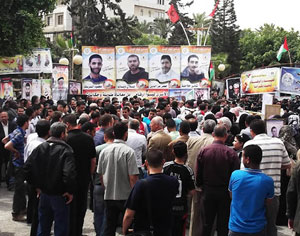 The Palestinian Prisoners' Hunger Strike began 15 days ago (April 17) to resist Israeli violations of prisoners' rights and policy of administrative detention, without charges or trial. More than 2,000 Palestinian prisoners are now on hunger strike, continuing to protest their arbitrary detention, solitary confinement and other mistreatment by Israeli authorities.
The Palestinian Prisoners' Hunger Strike began 15 days ago (April 17) to resist Israeli violations of prisoners' rights and policy of administrative detention, without charges or trial. More than 2,000 Palestinian prisoners are now on hunger strike, continuing to protest their arbitrary detention, solitary confinement and other mistreatment by Israeli authorities.
On May 3, 50 Palestinian activists, including many former prisoners of the state of Israel, began a hunger strike in solidarity with hunger-striking Palestinian prisoners currently being held inside Israeli prisons. A solidarity tent has been set up in the center of Gaza's Unknown Soldier Square for the strikers. They have confirmed their plan to stay in the tent and continue their hunger strike for as long as the prisoners' hunger strike continues.
Many Palestinian organizations, governmental bodies and politicians have confirmed their support for the prisoners’ strike and the solidarity hunger strikers. Representatives from the leadership of the Palestinian lawyers union, doctors from the ministry of health, and journalists have affirmed their determination to pursue the prisoner issue within the media.
On May 2, a car caravan in support of the striking prisoners rolled through the major West Bank city of Ramallah with horns blaring and flags flying. Each of the fifteen or so cars was covered with posters of Palestinian prisoners currently on hunger strike. The caravan served to inform the public and rally support for the prisoners, as their strike spreads and Israeli efforts to end it intensify. In addition, several hundred students on demonstrated outside Ofer military prison near Ramallah, demanding the prisoners be released.
In addition, a Tunisian delegation is visiting Gaza. The delegation conveyed the Tunisian people’s revolutionary greetings to the Palestinian people.
The delegation called on Arab and Muslim countries to support the prisoners' demands and called on the Israeli occupiers to meet their demands. The delegation includes a medical group to offer medical aid to strikers, both those in the prisons and those acting in solidarity in Gaza. It also includes jurists who will bring legal cases against Israeli crimes against the Palestinian people.
[TOP]
Statements from the Leadership Committee of Palestinian Prisoners on Hunger Strike
The following two statements were issued by the Higher National Leadership Committee of the Prisoners’ Struggle, speaking to their just stand defending the rights of Palestinians and demanding justice, and respect for the dignity and human rights of the prisoners. The second was issued April 28, the first on April 16, 2012 launching the mass hunger strike on Palestinian Prisoners’ Day, April 17, 2012. The text of the two statements follows:
Statement No. 2 from Strike Leadership:
We will continue until our demands are met
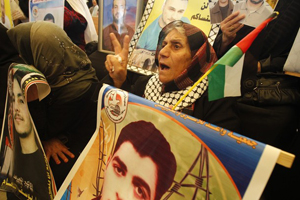 This is the moment of truth, where hunger grips our bleeding wounds. This is a call of duty that only the weak or cowardly can ignore. We are facing a real massacre committed by the Zionist jailers against our individual and collective rights, where we are confronted by torture and abuse on a daily basis, around the clock, in an attempt to force all of the hunger strikers to break the strike.
This is the moment of truth, where hunger grips our bleeding wounds. This is a call of duty that only the weak or cowardly can ignore. We are facing a real massacre committed by the Zionist jailers against our individual and collective rights, where we are confronted by torture and abuse on a daily basis, around the clock, in an attempt to force all of the hunger strikers to break the strike.
We are at a crucial and dangerous stage, and inspired by our hunger and our pain, speak to your conscience and affirm the following:
First, we will continue our strike. We will not go back, except by achieving our demands. We will not be defeated by their crimes and cruelty as we draft a vision for a decent life.
Second, we will take qualitative and unprecedented steps if the Prison Service continues to refuse our demands, and we will not announce these steps until the moment of implementation.
Third, we call on the masses of our people in the besieged Gaza Strip, the brave West Bank and all of Palestine, and our families at home, to organize mass rallies and marches toward Israeli checkpoints in order to confront the occupation.
Fourth, we expect our Arab brothers and sisters in Egypt and Jordan to encircle the embassies of the Zionist entity in order to force it to respond to our demands.
Fifth, we call upon the free people of the world and the Arab and Muslim communities in all countries of the world to implement rallies, protests, occupations and sit-ins at Israeli embassies as an expression of solidarity with the prisoners’ cause and to expose the crimes of the Zionists.
Sixth, we value highly the reporting of Palestinian and Arab satellite channels in their coverage of our strike, including Al-Jazeera, that is consistent with the pulse of our nation and its identity, as well as al-Aqsa TV, al-Quds TV, and call upon the Arab and Palestinian media to exercise their duty to our just and humanitarian cause.
Seventh, we are looking forward to an important and active Egyptian role in support of our cause and we appeal to the ruling power in sister Egypt to do all in its power to compel the Zionist entity to commit to our demands, including ending the policy of solitary confinement and isolation and the abolition of the “Shalit law.”
Finally, We swear to continue to strike until our demands are met, no matter what the cost. We believe in our right to a dignified life even if we fall as martyrs. Our dignity is the greatest cost; we are committed before God; we must live with dignity or die.
Higher National Leadership Committee of the Prisoners’ Struggle
April 28, 2012
Statement No. 1: Announcing the first spark of the Intifada of the prisoners inside the cells of the occupation’s jails
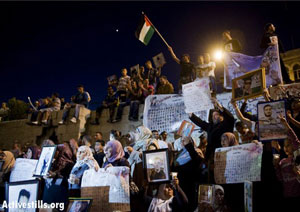 To our great Palestinian people —
To our great Palestinian people —
We believe in our right to liberty, our dignity, and the recovery of our stolen land and rights, and we announce the first spark of the battle in the occupation prisons (the battle to fulfill our promise) at the break of dawn on Tuesday, April 17, 2012, Palestinian Prisoners’ Day.
We promise to our martyrs and prisoners who have come before, and to all of our Palestinian people to continue this struggle until the full achievement of our rights and the end of the practice of solitary confinement, or until we die as martyrs.
Therefore, we call upon you to support us and our struggle locally and globally until we achieve victory or martyrdom. We have firm trust in you.
Victory for us, and for our great people!
Higher National Leadership Committee of the Prisoners’ Struggle
[TOP]
Palestinian Prisoners’ Hunger Strike
Determined and Spreading
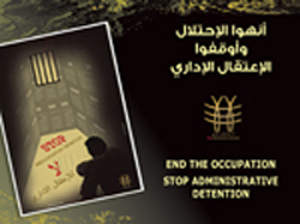 On April 17, 2012, Palestinian prisoners held in Israeli prisons launched a mass hunger strike demanding an end to administrative detention, isolation and other punitive measures taken against Palestinian prisoners including the denial of family visits and access to university education.
On April 17, 2012, Palestinian prisoners held in Israeli prisons launched a mass hunger strike demanding an end to administrative detention, isolation and other punitive measures taken against Palestinian prisoners including the denial of family visits and access to university education.
Approximately 1,200 Palestinian prisoners from all factions began an open hunger strike on 17 April, with the campaign gaining further momentum over this past week and additional prisoners joining daily. Addameer estimates that the current number of prisoners engaged in open-ended hunger strikes is around 2,000. This number includes the 19 prisoners currently held in isolation for “security reasons.” Ahmad Sa’adat, the imprisoned Secretary General of the Popular Front for the Liberation of Palestine (PFLP), who has been held in isolation for over three years, reported on 23 April that since the beginning of his hunger strike on 17 April, he had already lost 6 kg.
As during hunger strikes in the past, the Israeli Prison Service (IPS) has escalated its punishments of hunger striking prisoners in an effort to undermine the campaign. Methods of punishment currently being employed against hunger striking prisoners include attacks on prisoners’ sections; confiscation of personal belongings; transfers from one prison to another; placement in solitary confinement; fines; and denial of family and lawyer visits. Addameer lawyers have been denied access to all hunger striking prisoners.
Forty prisoners who began their hunger strike today in Ofer prison were informed that they will be transferred to another section of the prison and will not be permitted to bring with them any personal belongings except clothes. In Ashkelon prison, the 150 hunger strikers are experiencing daily raids and attacks on their rooms by Israeli special forces. In addition to all personal belongings being confiscated, the IPS also confiscated the hunger-striking prisoners’ only nourishment: salt for their water. Hunger striking prisoners in Nafha prison have also had their salt confiscated, raising serious health concerns for the prisoners engaged in hunger strike. Of the approximately 400 prisoners on hunger strike in Nafha, at least 40 were transferred out of their sections. Hunger strikers in Nafha have also been subjected to fines and electricity was cut in their rooms. On April 23, six prisoners joined in the hunger strike in Naqab prison and were all immediately placed in solitary confinement. Female prisoner Lina Jarbouni also declared an open-ended hunger strike on April 19 and was taken to solitary confinement on the same day. These aforementioned measures are only a few examples of the widespread punishment, particularly the use of transfers and solitary confinement, currently facing the hunger striking prisoners, as an attempt by the IPS to further isolate them from the outside world and from other prisoners involved in the campaign.
Meanwhile, eight prisoners, including five administrative detainees, remain on extended hunger strikes launched prior to April 17. Seven of these prisoners have been transferred to Ramleh prison medical center. Thaer Halahleh and Bilal Diab are on their 57th day of hunger strike today. Despite their rapidly deteriorating medical condition, both of their appeals against their administrative detention orders were rejected by an Israeli military judge on April 23. Yesterday, April 24, Hassan Safadi’s petition to the Israeli High Court against his administrative detention was rejected. He is on his 52nd day of hunger strike. Administrative detainees Omar Abu Shalal and Jaafar Azzedine are on their 50th and 35th days of hunger strike respectively. Also now in Ramleh prison medical center are Mohammad Taj, on his 39th day of hunger strike demanding to be treated as a prisoner of war, and Mahmoud Sarsak, on his 34th day of hunger strike in protest of being held under Israel’s Unlawful Combatants Law. Lastly, Abdullah Barghouti, held in isolation in Rimon prison, is on his 14th day of hunger strike. Addameer reiterates its grave concern that these hunger strikers are not receiving adequate healthcare in the IPS medical center and that independent doctors are still being denied visits to them.
Despite the punitive measures being taken against hunger striking prisoners, the campaign of hunger strikes continues to grow. The six female prisoners in Hasharon who are not already on hunger strike have announced that they will begin an open hunger strike on May 1. Additional prisoners are also expected to gradually join the campaign, including 120 in Ofer prison, who will start their hunger strike on April 29. As the mass hunger strike picks up even more momentum, it will become that much more crucial for hunger striking prisoners to have unrestricted access to their lawyers and independent doctors.
In light of these developments, an upsurge of action at the international level is necessary to bring attention to the legitimate demands of Palestinian prisoners. Addameer therefore renews its call on all political parties, institutions, organizations and solidarity groups working in the field of human rights in the occupied Palestinian territory and abroad to support the prisoners in their campaign of hunger strikes.
[TOP]
May 5: Mobilize in Support of Palestinian Political Prisoners!
 The Palestinian political prisoners have become a symbol of steadfastness and unbreakable determination, standing up for freedom and justice. Counting on nothing more than their own imprisoned bodies and their free spirits, their hunger strikes have already been able to raise awareness and mobilize people across Palestine and the world.
The Palestinian political prisoners have become a symbol of steadfastness and unbreakable determination, standing up for freedom and justice. Counting on nothing more than their own imprisoned bodies and their free spirits, their hunger strikes have already been able to raise awareness and mobilize people across Palestine and the world.
At present some 2500 Palestinian prisoners are on hunger strike, most since April 17; eight other Palestinian political prisoners have been hunger striking for more than 50 days and are in critical medical condition. Tha’er Halahleh and Bilal Diab have been on a hunger strike since February 29 – for over 60 days.
Tomorrow, on May 1, many more prisoners will join the hunger strike.
We ask you to join the escalating protests within Israeli prisons with your solidarity: mobilize for solidarity actions and initiatives around the globe on May 5.
We ask you to:
• Organize street protests and sit-ins
• Create online actions to raise awareness
• Denounce and campaign against contracts with Israeli or international companies involved in the Israeli prison system, such as G4S.
• Protest the media blackout on the struggle of the Palestinian prisoners, reinforcing the isolation of the prisoners.
The Palestinian prisoners struggle is urgent and needs our immediate action.
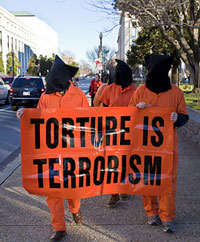 Imprisonment is a key component of Israel’s system of occupation, colonialism and apartheid practiced against the Palestinian people for decades. Some 40 percent of the male population of the Palestinians in the occupied West Bank and Gaza have been incarcerated by Israel. As of April 2012, there were 4,610 Palestinian prisoners held in Israeli prisons, including 203 child prisoners, 6 female prisoners and 27 members of the Palestinian Legislative Council. 322 Palestinians are currently held in administrative detention, without charges or trial.
Imprisonment is a key component of Israel’s system of occupation, colonialism and apartheid practiced against the Palestinian people for decades. Some 40 percent of the male population of the Palestinians in the occupied West Bank and Gaza have been incarcerated by Israel. As of April 2012, there were 4,610 Palestinian prisoners held in Israeli prisons, including 203 child prisoners, 6 female prisoners and 27 members of the Palestinian Legislative Council. 322 Palestinians are currently held in administrative detention, without charges or trial.
Palestinian political prisoners face systematic torture and ill treatment during their arrest and detention and are often denied family and lawyer visits. Wide-ranging and collective punishments, including prolonged periods of isolation, attacks on prisoners by special military forces and denying access to education are used against Palestinian prisoners in an attempt to suppress any form of civil disobedience within the prisons. […]
Now it is time to stop Israeli violations of Palestinian prisoners’ rights and to stand in solidarity with the Palestinian political prisoners on hunger strike who demand at the very least the respect of international standards of fair trials, international law and human rights, in particular:
• An end to the policy of administrative detention (detention without charge or trial)
• An end to the policy of solitary confinement
• Immediate revocation of the “Shalit” law (a series of measures to punish prisoners for the capture of Israeli soldier Gilad Shalit through worsening their conditions of confinement)
•An end to restrictions on and denial of appropriate medical care of prisoners
•An end to restrictions on and denial of appropriate education for prisoners
• Lifting the 5-year long de facto ban on families from Gaza to visit their relatives in Israeli prisons; and access to family visits for the hundreds of families from the West Bank that suffer a similar ban
May 5: Act in solidarity with the Palestinian hunger strikers!
[TOP]
25 Ohio Super Max Prisoners
Start a Hunger Strike
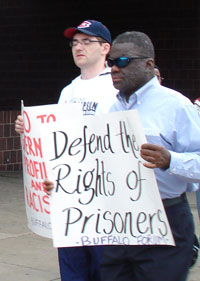 On Monday April 30, at least twenty-five prisoners at Ohio State Penitentiary (OSP) began a hunger strike. They are demanding that the Warden meet and negotiate with them for improved conditions in Ohio’s super-max prison. These hunger strikers say they intend to continue to refuse food until their demands are met. Another, larger group of prisoners will show symbolic solidarity with the hunger strikers, and workers outside of prison by also refusing food on a one-day fast for May Day, the international day of worker solidarity and resistance.
On Monday April 30, at least twenty-five prisoners at Ohio State Penitentiary (OSP) began a hunger strike. They are demanding that the Warden meet and negotiate with them for improved conditions in Ohio’s super-max prison. These hunger strikers say they intend to continue to refuse food until their demands are met. Another, larger group of prisoners will show symbolic solidarity with the hunger strikers, and workers outside of prison by also refusing food on a one-day fast for May Day, the international day of worker solidarity and resistance.
Information about the hunger strike is limited at this time, because super-max prisoners have very constrained access to communication with the outside world. The hunger strikers are asking supporters of their cause to participate by calling Warden David Bobby (330 743-0700) and ODRC director Gary Mohr (614-752-1164). The hunger strikers are asking people to encourage Warden Bobby to meet with the prisoners and take their demands seriously.
This is the second hunger strike at OSP this year. The first occurred on Feb 20-23. That hunger strike ended with Warden Bobby, as well as officials from Central Office in Columbus, promising to increase recreation time to the court-mandated minimum as well as improve enrichment programming, food quality and commissary practices. [...]
Ohio State Penitentiary opened in 1998. It houses over 270 level 4 and 5 maximum security prisoners, and until recently also housed 116 of Ohio’s death row prisoners. OSP was built in response to the 1993 uprising at Southern Ohio Correctional Facility in Lucasville.
[TOP]
California Prisoners in Solitary Petition United Nations: “CDCR Destroys Our Minds, Souls And Spirits”
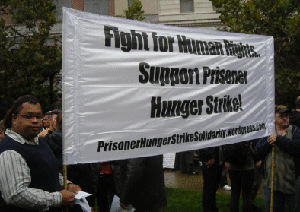 Comparing their conditions to a “living coffin,” 400 California prisoners held in long-term or indefinite solitary confinement petitioned the United Nations recently to intervene on behalf of all of the more than 4,000 prisoners similarly situated.
Comparing their conditions to a “living coffin,” 400 California prisoners held in long-term or indefinite solitary confinement petitioned the United Nations recently to intervene on behalf of all of the more than 4,000 prisoners similarly situated.
“California holds more prisoners in solitary confinement than any other state in the United States or any other nation on earth. The treatment of these prisoners is barbaric and, numerous experts agree, amounts to torture,” said Peter Schey, who heads the Center for Human Rights and Constitutional Law. He is lead counsel for the prisoners who have “joined together to petition the United Nations to intervene by conducting on-site investigations, permitting Red Cross visits, and ultimately ruling that California’s policy on isolated segregation amounts to torture and violates well-established international human rights norms.”
The petition, released at a press conference in Los Angeles March 20, calls for UN action against California’s prison administration and deplores the conditions of thousands of California prisoners Schey says are “being detained in isolated segregated units for indefinite periods or determinate periods of many years solely because they have been identified as members of gangs or found to have associated with a gang.” The petition explains, “The policy that has resulted in their prolonged detention does not require that they have actually engaged in any misconduct or illegal activity, or that they even planned to” do so.
The 400 petitioners are held in 23-hour-a-day lockdown in California’s Security Housing Units (SHUs) and Administrative Segregation Units (ASUs or AdSeg) that “destroy their mental and physical health and destroy them spiritually. They live like prisoners held in a gulag, not a modern democracy,” states Schey. The prisoners have been joined in their petition by a coalition of state and national advocacy groups.
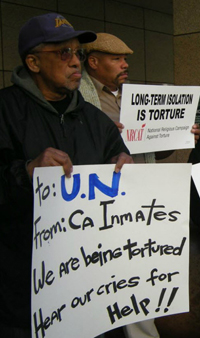 “Conditions inside California’s SHUs and ASUs were at the center of two massive waves of hunger strikes last summer and fall that saw the participation of thousands of prisoners in at least a third of California’s 33 prisons. A key demand of the strikes was the abolition of the California prison system’s draconian gang validation and debriefing processes, behind which a vast majority of prisoners in SHUs and ASUs have been held in solitary confinement,” says Isaac Ontiveros, spokesman for Prisoner Hunger Strike Solidarity.
“Conditions inside California’s SHUs and ASUs were at the center of two massive waves of hunger strikes last summer and fall that saw the participation of thousands of prisoners in at least a third of California’s 33 prisons. A key demand of the strikes was the abolition of the California prison system’s draconian gang validation and debriefing processes, behind which a vast majority of prisoners in SHUs and ASUs have been held in solitary confinement,” says Isaac Ontiveros, spokesman for Prisoner Hunger Strike Solidarity.
“I am being persecuted for exercising my First Amendment rights to protest the inhumane treatment and torture being applied directly against myself and similarly situated prisoners held in CDCR (California Department of Corrections and Rehabilitation) torture chambers – SHU and AdSeg solitary confinement units. What my fellow CDCR prisoners don’t know is that CDCR has malicious intent to destroy the minds, souls and spirits of 4,000-plus prisoners by any means necessary,” writes Mutope Duguma, s/n James Darren Crawford, a frequent contributor to the Bay View and a leading hunger strike organizer housed in the SHU at the notorious Pelican Bay State Prison.
His testimony is among those of 22 lead petitioners who provided extensive information on how they came to be placed in isolation and the toll it has taken. A total of 400 prisoners representing many races and prisons signed on to the petition.
“I have been housed in the SHU since July 1987. I have seen fellow prisoners murdered by correctional officers, mentally ill prisoners abused, I have seen men psychologically break down, cry, scream and go insane. I have been beaten by correctional officers, threatened and set up. I was told by a correctional officer at Pelican Bay State Prison that I would die here one way or another, and every day I meditate to keep control. The SHU is a soul sucking, mind-bending torture that murders all humanity in any human being. Some die quicker than others … but we all die inside,” writes Alfred Sandoval, also a leading hunger strike organizer at Pelican Bay.
“As a result of the policies and practices that leave California with the largest population of prisoners in isolated segregation anywhere in the world, these prisoners suffer extreme mental and physical harm, including mental breakdowns, extreme depression, suicidal ideation, and breaks with reality, such that their treatment may be considered torture or degrading treatment illegal under well-established international norms and obligations of the United States and the state of California under, inter alia, the United Nations Convention Against Torture and Other Cruel, Inhumane or Degrading Treatment or Punishment (CAT) and the International Covenant on Civil and Political Rights (ICCPR),” the petition states. The petition names as responding parties the United States of America, the State of California, California Governor Jerry Brown and California Corrections and Rehabilitation Secretary Matthew Cate. […]
[Securing information from the prisoners for the petition was organized by family members together with Schey. It was an emotional and difficult process, with many prisoners telling their stories of torture and abuse for the first time. More than 400 testimonies were secured, including prisoners with a range of durations in segregation, from one year all the way up to 39 years. The 22 lead petitioners also represent a range of mental and medical conditions, lower level to extremely serious crimes, life sentences to those who are about to be released, ‘gang validation’ by a variety of illegal practices by CDCR and a racial balance. Families were also involved in the process and instrumental in securing the petition.]
Jean Casella and James Ridgeway of Solitary Watch observe, “The petition itself is a notable document for anyone concerned with solitary confinement in the United States. It runs to 63 pages and includes case studies of each of the named plaintiffs, along with extensive discussion and documentation of how their confinement violates both U.S. and international law.”
The petitioners accuse California’s prisons of subjecting inmates to “cruel, degrading and extreme punishment prohibited by international human rights norms and obligations of the United States of America, including the State of California.” It describes their conditions as follows:
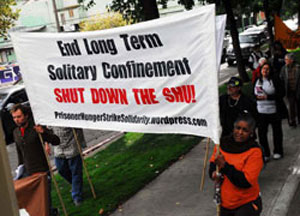 “[N]ot only do California prisoners face cruel and dehumanizing long-term and indefinite confinement in small concrete cells with no windows, no natural light and no furniture, they also endure frequent episodes of cruelty by guards, inadequate medical care, entirely inadequate mental health services, inadequate access to the outdoors and sunshine, inadequate food, inadequate access to legal counsel, inadequate visitation with friends and family and no opportunities to work or engage in productive activities of any type. They are effectively locked in a concrete small space that becomes a ‘living coffin’ in which many have been confined for many years, even decades.”
“[N]ot only do California prisoners face cruel and dehumanizing long-term and indefinite confinement in small concrete cells with no windows, no natural light and no furniture, they also endure frequent episodes of cruelty by guards, inadequate medical care, entirely inadequate mental health services, inadequate access to the outdoors and sunshine, inadequate food, inadequate access to legal counsel, inadequate visitation with friends and family and no opportunities to work or engage in productive activities of any type. They are effectively locked in a concrete small space that becomes a ‘living coffin’ in which many have been confined for many years, even decades.”
The U.N. Committee against Torture established under the Convention against Torture has recommended that the practice of placing prisoners in isolation be abolished altogether. Ending each round of last year’s hunger strike, the California Department of Corrections and Rehabilitation promised to make substantial changes to its gang validation and debriefing criteria.
But initial responses from hunger strike leaders to a new gang management strategy proposed by CDCR on March 1 and made public March 9 soundly reject it as a ploy to place far more prisoners in segregation… The organizers of last year’s hunger strike are seriously considering a resumption of the strike this summer. Advocates hope that the U.N. petition will stimulate a strong enough public outcry to prompt CDCR to meet the hunger strikers’ demands.
[TOP]
